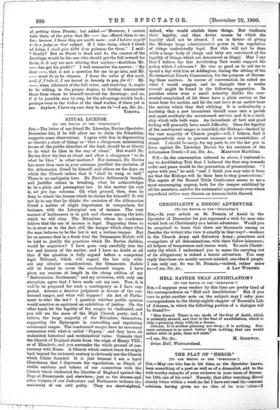RITUAL LICENSE.
(TO THE EDITOR OF THE "SPECTATOR."
Sra,—The letter of my friend Dr. Llewelyn Davies (Spectator, December 1st), if he will allow me to claim his friendship, suggests some observations. I agree with him in deprecating so chaotic a state of things as "that a clergyman, ministering in one of the public churches of the land, should be at liberty to do what he likes in the way of ritual." But would Dr. Davies draw the line at ritual and allow a clergyman " to do what he likes " in other matters ? For instance, Dr. Davies has more than once in your columns justified the omission of the Athanasian Creed by himself and others on the days on which the Church orders that it " shall be sung or said." There is no ambiguity here. Dr. Davies deliberately breaks, and justifies others in breaking, what he acknowledges to be a plain and peremptory law. In this matter his rule is, sit pro lege voluntas. On what ground, then, does he deny to others the license which he claims for himself ? It will not do to say that he thinks the omission of the Athanasian Creed a matter of slight importance in comparison, for instance, with the Liturgical use of incense. The very essence of lawlessness is to pick and choose among the laws which we will obey. The Ritualists whom he condemns believe that the use of incense is legal. Supposing them to be in error as to the fact, still the temper which obeys what the man believes to be the law is not a lawless temper. But let us assume that in a fresh trial the Ornaments Rubric will be held to justify the practices which Dr. Davies dislikes, would he acquiesce ? I have gone very carefully into the law and history of the matter, and I have no doubt at all that if the question is fully argued before a competent legal Tribunal, which will regard the law only with- out any ulterior considerations, the Ornaments Rubric will be found to cover the condemned usages. I have given my reasons at length in the cheap edition of my " Reformation Settlement," and my reviewers, with only one exception, agree that I have made out my case. Now, it is well to be prepared for such a contingency as I have sug- gested. Assume a decisive judgment in favour of the con- demned usages, and what will happen ? An Act of Parlia- ment to alter the law ? I question whether public opinion would sanction so equivocal an exhibition of justice. On the other hand, let the legality of the usages be vindicated, and you will see the mass of the High Church party, and, I believe, the large majority of the Ritualists themselves, supporting the Episcopate in controlling and regulating ceremonial usages. The condemned usages have no necessary connection with what is called " Popery," and they have an undoubted historical and ecclesiastical value. Concede that the Church of England starts from the reign of Henry VIII., or of Elizabeth, and you surrender the whole ground of con- troversy with Rome. A Church which cannot trace its origin back beyond the sixteenth century is obviously not the Church which Christ founded. It is just because I am a loyal Churchman that I deprecate the repudiation, as illegal, of visible emblems and tokens of our connection with the Church which vindicated the liberties of England against the Pope at Runnymede and elsewhere ; just as the dresses and other insignia of our Judicature and Parliament indicate the cksitinuity of our civil polity. They are short-sighted, indeed, who would abolish these things. But vindicate their legality, and then devise means by which the legality shall not be abused. I am in favour of giving the Bishops large administrative power in the regulation of things undoubtedly legal. But this will not be done while a large body of clergy and laity are convinced of the legality of things which are denounced as illegal. May I say that I believe the late Archbishop Tait would support the policy which I advocate ? He was so good as to ask me to spend a day with him at Addington, during the sitting of the Ecclesiastical Courts Commission, for the purpose of discuss- ing these matters. In course of conversation he asked me what I would suggest, and he thought that a modus vivendi might be found in the following suggestion. In parishes where even a small minority dislike the cere- monial complained of, let these have a plain service at the usual hour for matins, and let the rest have at an earlier hour the service which they find edifying. It is undoubtedly a hardship that a new incumbent should come into a parish and upset suddenly the accustomed service, and it is a hard- ship which tells both ways. An incumbent of tact and good feeling will generally have small difficulty. Once the legality of the condemned usages is conceded, the Bishops—backed by the vast majority of Church people—will, I believe, find it comparatively easy to prevent excesses or eccentricities of ritual. I should be sorry, for my part, to see the law put in force against Dr. Llewelyn Davies for his omission of the Athanasian Creed.—I am, Sir, &c., MALcoLm P.S.—In the conversation referred to above, I ventured to say to Archbishop Tait that I believed the first step towards order and peace would be the prevention of prosecutions. " I agree with you," he said, "and I think you may take it from me that the Bishops will do their best to stop prosecutions." The report of the Round Table Conference seems to me a most encouraging augury, both for the temper exhibited by all the members, and for the substantial agreement even where superficial critics may discern an irreconcilable discord.






































 Previous page
Previous page